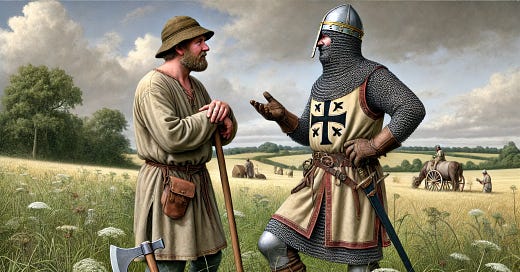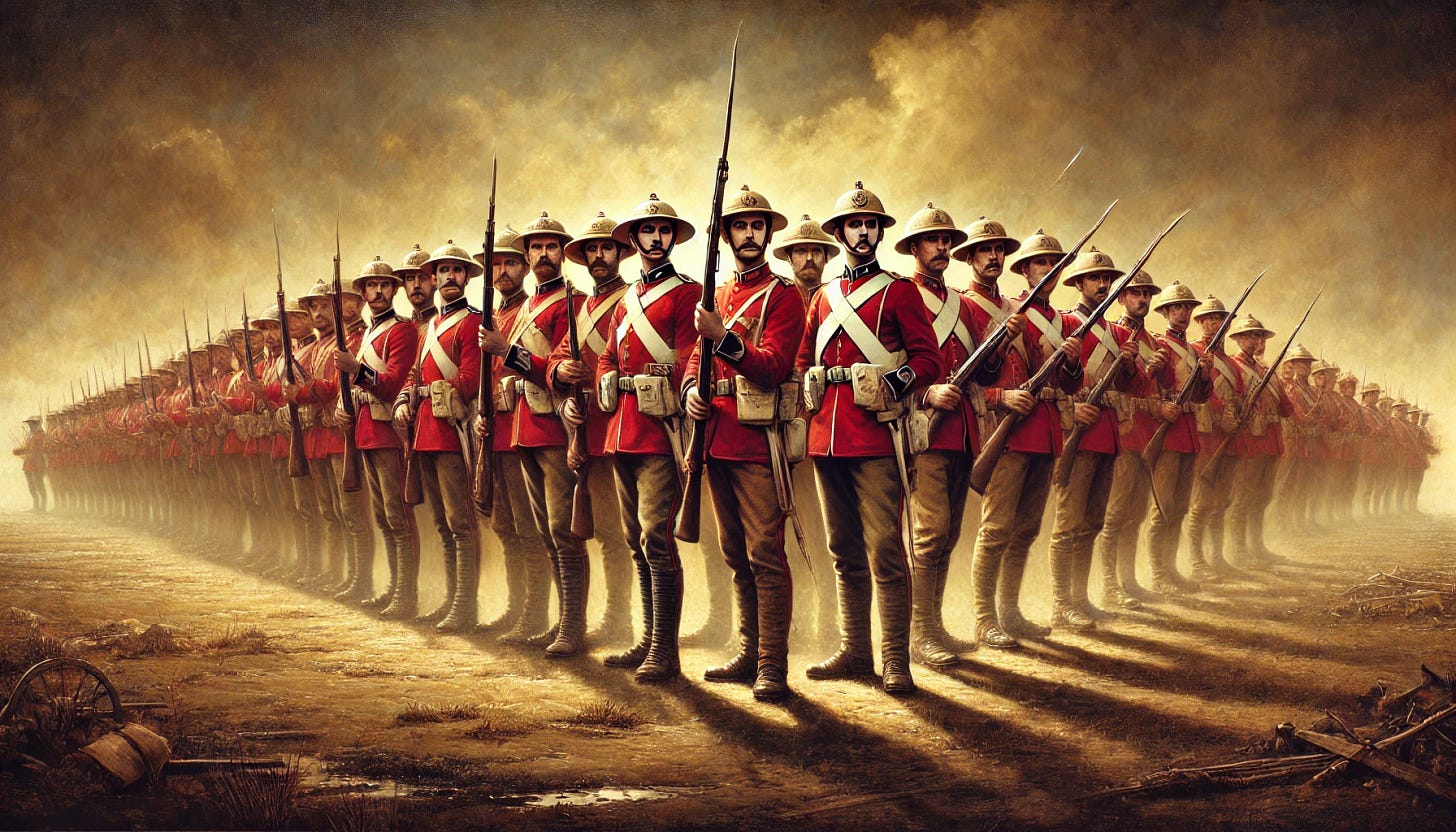This morning I proof-read a review of Nigel Biggar’s Colonialism: A Moral Reckoning which I shall publish next week. In doing so I had to deal with the suggestion that white supremacy drove colonialism.
In the back of my mind I had an echo of a poem by Rudyard Kipling.
Born in 1865 in Bombay, British India, Kipling’s formative years were spent in the heart of the British Empire. His early exposure to Indian culture, combined with the colonial ethos of his upbringing, deeply influenced his worldview and literary style. Kipling’s experiences in India provided the foundation for much of his work, enabling him to write with authority on the complexities of imperial life.
Some of his works reflect a belief in the inherent superiority of British civilization and its duty to uplift "lesser" cultures bringing the benefits of Western civilization.
One of Kipling’s most famous poems, The White Man’s Burden (1899), epitomizes this theme. Written in the context of the United States’ annexation of the Philippines, the poem extends an imperialist call to action. Kipling exhorts Western powers to take up the "burden" of civilizing non-Western peoples, portraying imperialism as a moral obligation fraught with hardship.
The poem reflects its era. While the poem has been criticized it also reveals Kipling’s awareness of the costs of imperial rule, both for the colonizers and the colonized.
In contrast, poems like Recessional (1897) convey a more introspective and cautionary tone. Written for Queen Victoria’s Diamond Jubilee, the poem warns against the hubris of empire and reminds the British people of their mortality and dependence on divine providence. Lines such as "Lest we forget—lest we forget!" serve as a somber reminder of the fleeting nature of power and the moral responsibilities that accompany it.
Kipling’s poetry also celebrates the resilience and courage of the British soldiers and administrators who sustained the Empire. If—, though not explicitly about imperialism, encapsulates the values of stoicism, duty, and perseverance that Kipling admired in the empire-builders. Similarly, Gunga Din acknowledges the humanity and bravery of an Indian water-carrier serving the British army. That is a favourite of mine but that’s another story.
But the Empire of the Victorian era differed in many respects from the invasion and colonisation of England by the Normans in 1066. His poem Norman and Saxon was published in 1911and is advice from a conqueror about how to deal with the conquered. It perhaps suggests a means by which colonisers may deal with the colonised. And it is good advice irrespective of the time.
Norman and Saxon explores the moment when one member of the conquering race is beginning to understand that while the Saxons may be less civilised, less powerful, and perhaps less sensitive than the Normans, they do, nevertheless, possess distinctive and useful qualities of their own which will not be suppressed. Eventually differences between Norman and Saxon will disappear and be replaced by a distinctive ‘ English’ race. This is barely hinted at in ‘Norman and Saxon,’ though the Saxon qualities which are half-admired by the Norman baron are there to point the way forward.
But one thing is clear. The colonisation in this poem has nothing to do with “white supremacy”. Given that colonisation has been a part of human history since the beginning of time, that suggestion is a fallacy.
The poem reads as follows:
"My son," said the Norman Baron, "I am dying, and you will be heir
To all the broad acres in England that William gave me for share
When he conquered the Saxon at Hastings, and a nice little handful it is.
But before you go over to rule it I want you to understand this:–
"The Saxon is not like us Normans. His manners are not so polite.
But he never means anything serious till he talks about justice and right.
When he stands like an ox in the furrow – with his sullen set eyes on your own,
And grumbles, 'This isn't fair dealing,' my son, leave the Saxon alone.
"You can horsewhip your Gascony archers, or torture your Picardy spears;
But don't try that game on the Saxon; you'll have the whole brood round your ears.
From the richest old Thane in the county to the poorest chained serf in the field,
They'll be at you and on you like hornets, and, if you are wise, you will yield.
"But first you must master their language, their dialect, proverbs and songs.
Don't trust any clerk to interpret when they come with the tale of their wrongs.
Let them know that you know what they're saying; let them feel that you know what to say.
Yes, even when you want to go hunting, hear 'em out if it takes you all day.
They'll drink every hour of the daylight and poach every hour of the dark.
It's the sport not the rabbits they're after (we've plenty of game in the park).
Don't hang them or cut off their fingers. That's wasteful as well as unkind,
For a hard-bitten, South-country poacher makes the best man-at-arms you can find.
"Appear with your wife and the children at their weddings and funerals and feasts.
Be polite but not friendly to Bishops; be good to all poor parish priests.
Say 'we,' 'us' and 'ours' when you're talking, instead of 'you fellows' and 'I.'
Don't ride over seeds; keep your temper; and never you tell 'em a lie!"
Kipling also had a deep awareness of the nature of those upon whose shoulders the Empire was built. His poem Tommy was first published in 1890 and was collected under Barrack Room Ballads.
The poem depicts the contemptuous way in which the British soldier of the day was treated. The soldier is praised and feted when he is needed but is shunned when he is not. And Tommy is well aware of the civilian’s two faced attitude.
Here is the poem, written in Kipling’s colloquial voice.
I went into a public 'ouse to get a pint o' beer,
The publican 'e up an' sez, "We serve no red-coats here."
The girls be'ind the bar they laughed an' giggled fit to die,
I outs into the street again an' to myself sez I:
O it's Tommy this, an' Tommy that, an' "Tommy, go away";
But it's "Thank you, Mister Atkins," when the band begins to play
The band begins to play, my boys, the band begins to play,
O it's "Thank you, Mister Atkins," when the band begins to play.
I went into a theatre as sober as could be,
They gave a drunk civilian room, but 'adn't none for me;
They sent me to the gallery or round the music-'alls,
But when it comes to fightin', Lord! they'll shove me in the stalls!
For it's Tommy this, an' Tommy that, an' "Tommy, wait outside";
But it's "Special train for Atkins" when the trooper's on the tide
The troopship's on the tide, my boys, the troopship's on the tide,
O it's "Special train for Atkins" when the trooper's on the tide.
Yes, makin' mock o' uniforms that guard you while you sleep
Is cheaper than them uniforms, an' they're starvation cheap.
An' hustlin' drunken soldiers when they're goin' large a bit
Is five times better business than paradin' in full kit.
Then it's Tommy this, an' Tommy that, an' Tommy, 'ow's yer soul?"
But it's "Thin red line of 'eroes" when the drums begin to roll
The drums begin to roll, my boys, the drums begin to roll,
O it's "Thin red line of 'eroes," when the drums begin to roll.
We aren't no thin red 'eroes, nor we aren't no blackguards too,
But single men in barricks, most remarkable like you;
An' if sometimes our conduck isn't all your fancy paints,
Why, single men in barricks don't grow into plaster saints;
While it's Tommy this, an' Tommy that, an' Tommy, fall be'ind,"
But it's "Please to walk in front, sir," when there's trouble in the wind
There's trouble in the wind, my boys, there's trouble in the wind,
O it's "Please to walk in front, sir," when there's trouble in the wind.
You talk o' better food for us, an' schools, an' fires, an' all:
We'll wait for extry rations if you treat us rational.
Don't mess about the cook-room slops, but prove it to our face
The Widow's Uniform is not the soldier-man's disgrace.
For it's Tommy this, an' Tommy that, an' Chuck him out, the brute!"
But it's "Saviour of 'is country" when the guns begin to shoot;
An' it's Tommy this, an' Tommy that, an' anything you please;
An' Tommy ain't a bloomin' fool - you bet that Tommy sees!
In some respects, the sentiments in Tommy come through in the words of Colonel Nathan Jessup in A Few Good Men. This clip says what Tommy says in a more pungent and dramatic form.
Tommy may have lost some of its initial magic, but it remains a powerful expression of public unease whenever the Army or Armed Forces are neglected by the government of the day.
Unfortunately, this happens with such frequency that “Tommy” remains one of the most quoted, or parodied, of Kipling’s poems in the press. A recent example under the title Tommy in the 21st Century appeared in the Sunday Telegraph on 28 December 2003. One refrain of the verses, which were written by Peter Pindar and subtitled ‘Queen’s speech praises Armed Forces’ (that speech having been written for Her Majesty by the government), was:
Yes, it’s Tommy this, an’ Tommy that, an’ spend less on defence,
But who walks the streets of Basra when the air is getting tense?
When the air is getting tense, boys, from Kabul to Kosovo
Who’ll say goodbye to wife and kids, and shoulder pack and go?
It is sometimes worth thinking about when the buzzwords and the criticisms and the self-righteous tones begin to fill the room.






Thanks to Just Boris for his comment
As to his PS about Kipling's "Reeds of Runnymede"
In 1966 when I was at law school we had the privilege of being addressed by Lord Denning who was visiting for a Law Conference. His speech was inspiring and Denning was at the height of his powers. Now there was an activist Judge if there ever was one.
He recited the last verse of the "Reeds of Runnymede" which remained etched in my memory.
I did my own recitation in 2019 when we made a pilgrimage to the meadow. Kipling sure had an ear and a pen for capturing important elements.
And still when Mob or Monarch lays
Too rude a hand on English ways,
The whisper wakes, the shudder plays,
Across the reeds at Runnymede.
And Thames, that knows the moods of kings,
And crowds and priests and suchlike things,
Rolls deep and dreadful as he brings
Their warning down from Runnymede!
Wonderful reflections on the works of a complete genius, thank you. I’m 3/4 through Biggar’s book and whilst I was already part of the pro-Brit flock, it has been an excellent read. Well researched and he’s not ashamed to promote his perspective (yet offers fair balance throughout). I’ll be very interested to read your take, in particular with regard to the role of British exporting their ‘worldview’. I’d aver the Judeo-Christian worldview is the pivotal factor for improving quality of life across the globe. Then and today. Call me a humble religious ‘supremacist’ I guess.
ps I love ‘The Reeds of Runnymede’ which I hope appeals to you as a leading legal light.